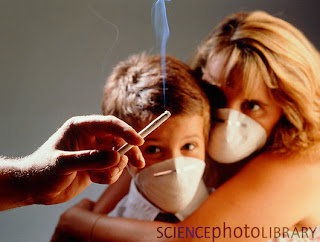
In Susan Richards's experience, fear can be a lifesaver.
Richards is an instructor with Teen SmokeStoppers, a program that tries to alert young people to the dangers of smoking. The program is run through the SWIM Across the Sound program at St. Vincent's Medical Center in Bridgeport.
Richards said she and other instructors often use shock value to illustrate how life threatening tobacco use can be. For instance, they've shown students a diseased lung in a jar.
"We'll show them anything we think will work," Richards said. "We have a jar of phlegm to show them how COPD (chronic obstructive pulmonary disease) patients can't cough up phlegm. I don't think of it as (using) fear. I think of it as showing them reality."
Thus, she was in favor of the graphic cigarette labels the Food and Drug Administration unveiled in June, which were supposed to be carried on all
cigarette packs starting in September of this year. The labels used disturbing photos -- including a picture of a man smoking through a tracheotomy hole in his throat -- in addition to written warnings meant to dissuade smokers. While anti-smoking advocates such as Richards cheered the new labels, tobacco companies were, not surprisingly, perturbed by them.
This week, the tobacco companies gained a victory, as U.S. District Judge Richard Leon issued a 19-page ruling that found the labels violate free-speech protection. Leon agreed with the defendants that the packaging was forcing tobacco companies to serve as an "unwilling mouthpiece" for the FDA and the U.S. Department of Health and Human Services.
"The graphic images here were neither designed to protect the consumer from confusion or deception, nor to increase consumer awareness of smoking risks," wrote Leon in his ruling. "Rather, they were crafted to evoke a strong emotional response calculated to provoke the viewer to quit or never start smoking."
This is the second time Leon has ruled with the tobacco companies, having granted a temporary injunction against the FDA labels in November. The FDA appealed that decision, and the government seemed poised to take issue with this latest ruling as well.
On Thursday morning, Health and Human Services Secretary Kathleen Sebelius issued a brief statement saying President Barack Obama's administration is "determined to do everything we can to warn young people about the dangers of smoking, which remains the leading cause of preventable death in America." She added that the administration is "confident that efforts to stop these important warnings from going forward will ultimately fail."
Locally, the ruling upset some anti-smoking advocates, including Richards.
"I'm disappointed," she said. "Even if they just help save one person, then those labels are useful."
Pamela Mautte, director of BHCare's Valley Substance Abuse Action Council in Ansonia, agreed.
"I do think the labels would be very helpful," she said. "A lot of smokers and former smokers I've come into contact with say they think it would be a great deterrent."
However, both Richards and Mautte, like Sebelius, said they are confident the decision will be overturned and that the labels will eventually end up on cigarette packs.
"I think it's going to happen," Richards said.
Steven A. Raucher, chairman of the department of communication, film and theatre at the University of New Haven in West Haven, said he believes the FDA will, eventually, get the support of the courts. But, he said, Leon's ruling makes some cogent points about whether the FDA has the right to force companies to put the new labels on their products.
"Is protecting the health of children an overriding issue? Absolutely," Raucher said. "However, is this law narrowly tailored to meet this standard? That's the question."
Raucher said he doesn't find the pictures on the labels as problematic as the text. He said Canada and some European countries have used vivid graphics for years. Raucher said the inclusion of a smoking cessation hot line (1-800-QUIT-NOW) within the textual warning is likely more offensive to tobacco companies than the pictures. Indeed, Leon's ruling took issue with the inclusion of the phone number.
"The images, coupled with the placement of the toll-free number, do not `promote informed choice' but, instead, advocate to consumers that they should `QUIT NOW,' " the ruling reads.
Meanwhile, some believe it doesn't matter whether the labels end up on cigarette packs. Bruce Butler runs the Bridgeport Avenue Shell Station in Shelton, where he sells a variety of tobacco products. Even if the ruling is overturned and smokers are greeted with images of rotten lungs and bodies on autopsy tables, Butler said it probably won't make a difference. He compared the labels to the state's ever-rising cigarette taxes.
"Typically, sales are hit hard immediately after (the tax takes effect), then they ramp right back up again," Butler said. "This is just one more blip on the radar."



















